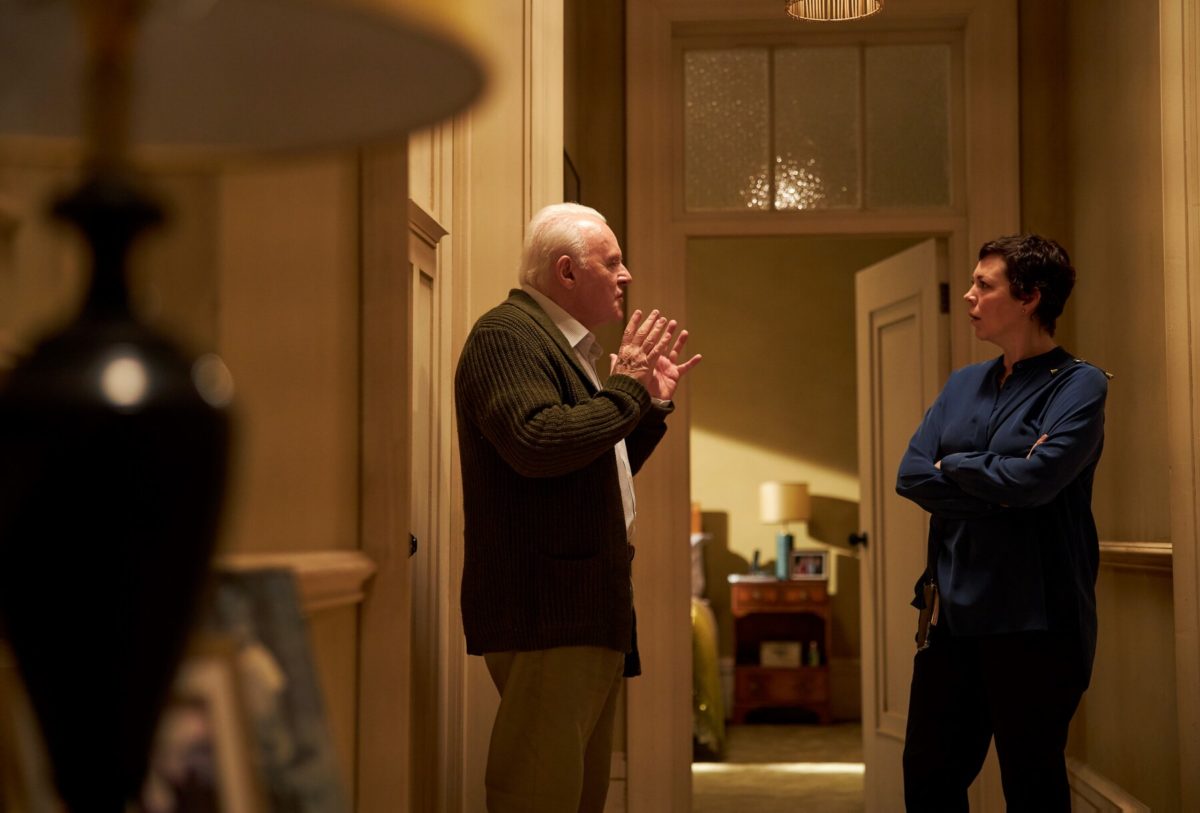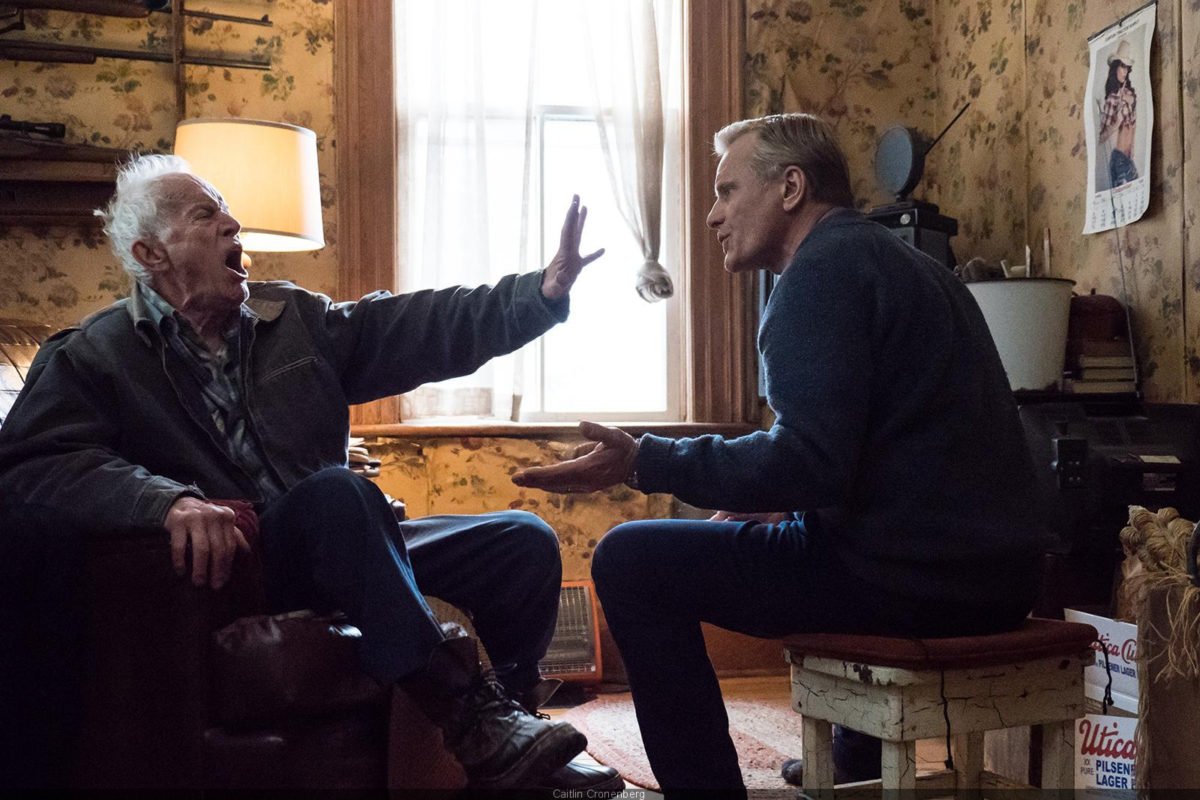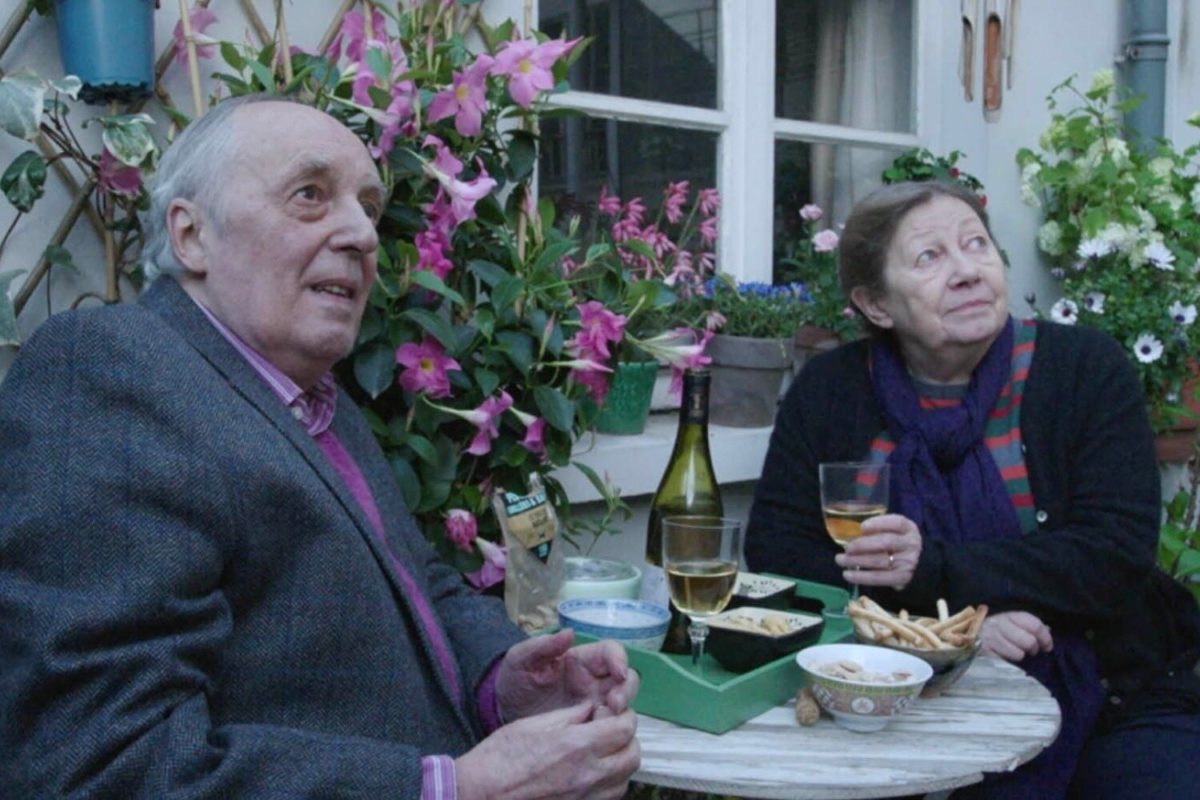You have to begin to lose your memory, if only in bits and pieces, to realize that memory is what makes our lives. Life without memory is no life at all… Our memory is our coherence, our reason, our feeling, even our action. Without it, we are nothing.
“I don’t need her or anyone else, I can manage very well on my own!” This is how Anthony—the titular character in The Father (Florian Zeller, 2020)—tries to convince his daughter Anne he is perfectly capable of living alone and he doesn’t require a carer (or later, staying in a nursing home). No matter the fork Anthony carries around in his jacket pocket or the fact he cannot connect the faces and names of people he meets, his pivot is the illusion of, or rather, the yearning for being able to function without anyone’s help. Wistful for the halcyon days in which his cognitive abilities were delimited by abundance rather than deficit, Anthony is anchoring his identity in the only role dementia has not taken away from him (yet)—being a father.
Our identities are malleable but tenacious, dependent on the continuity of our self-image, connecting temporal fractals dispersed among many years. Slowly, the biological inevitability of aging starts impacting our regular activities through cognitive decline and memory issues, leaving us mostly functional. Throw in a neurocognitive disorder, such as dementia, and we lose the ability to deal with mundane tasks, getting easily agitated by the simple act of putting on clothes, just like Anthony. As his efforts for dignity regress toward childhood patterns, our mirror neurons writhe in empathy. In Zeller’s first feature-length film, as well as in Viggo Mortensen’s directorial debut Falling (2020) and in Vortex (2021), the latest movie by Gaspar Noé, a silent realization that a steady loss of memories will negatively affect all of us grows more palpable with each passing scene. As these examples show, the exact perspective from which we face dementia doesn’t diminish the pain it brings—identity erosion is hard on the person unraveling, their inner circle, and any occurrent observer. Such stories have long been appealing to filmmakers, empowering them to explore some of the tenderest, yet most devastating aspects of the intricate dynamic between a person diagnosed with dementia and their loved ones; allowing us viewers to live through a more salient and highly condensed account of life past a certain age, when cognitive problems abound.

Zeller paints an excruciatingly realistic picture of Anthony’s trouble navigating the labyrinthine corridors of the past, present and future. In an isolated glimpse of Anthony’s former self during an introductory meeting with a potential carer at least twice younger than him, his daughter is surprised to be reminded of his socializing—maybe even womanizing—skills. What startles Anne more is the fact Anthony chooses to introduce himself as a tap dancer, showing off with a quick routine, even though his vocation was engineering. As alarming as the whole conversation with the carer is for Anne, Anthony’s behavior is exemplary of an individual caught in the battle between ego integrity versus despair. Eric Erikson, the psychologist who coined the phrase “identity crisis”, theorized that once we enter the seventh decade, we grow preoccupied with contemplating our accomplishments and reflecting on the coherence of our lives. Up until then, the equilibrium of remembering and forgetting has helped us build and maintain our identity, but once the scale tips toward memory loss we start to question (our) reality. While trying to integrate our experiences and stave off desolation, we cling to the parts of our identity that help us look back on our lives with a sense of closure and completeness. Anthony actuates this by telling the few people he sees about how intelligent he is, how much he loves his daughters, how he earned enough money to buy a big apartment in London, etc. This unavoidable part of Anthony’s aging is further complicated by dementia as his sense of time grows elastic, constantly expanding and collapsing onto itself, leaving him baffled about when things are happening and in what order.
Just as Anthony consistently misplaces his watch, his—and the film’s—temporal awareness jumps strings and runs around in circles, heightening Anthony’s agony that his time among the living is stolen away. Without linear storytelling as a guide, Anthony and the viewers have to lean on seemingly chaotic visual clues to ground themselves in the present. Forcing the audience to question what they (think they) see, the elaborate depiction of dementia concentrates on the feeling of being fossilized at hazy space-time coordinates, no longer accessible to Anthony due to his identity dissolution. While he sometimes badmouths his own daughter—which, to clarify, he is not doing on purpose, it’s dementia’s bad trick on his memory and understanding—Anthony’s love for Anne shines through in sporadic moments of lucidity, like an indestructible pillar of his life and identity.

Where Anthony is hard to handle at times, Willis in Mortensen’s Falling is outright mean to his children and their offspring, asking pointed questions deliberately framed to prove his way of thinking is the right one. Instead of integrating past life experiences and asking for forgiveness for his mistakes, Willis is fighting tooth and nail to keep living the way he has always done—without the help of outsiders, including his children. That’s not because he doesn’t care for them (in an admittedly generous interpretation of his behavior), but because being a tough macho man who “tells it like it is” is the only love language he can muster. For Willis, aging is just another bottom to hit, one more argument to go into as aggressively as possible, without second thoughts about the anguish his attitude might cause. His deep-seated bitterness about life quickly passes onto the people who are concerned for him. Even his son John, who promised himself he would not be lured in by the resentful bait Willis offers, cracks under the pressure of the constant “Which person I love will be hurt next?” rollercoaster of his father’s behavior.
Mood swings and flashbacks go hand in hand in Falling—the former portraying unexpected fragility and explosive anger, the latter encapsulating salient memories whose consequences Willis is unwilling to either acknowledge or accept. It’s as if all his recollections of the past are sloshing together inside his brain, upset by the slightest association with anything even remotely related. Akin to Zeller’s play with time in The Father, Mortensen renders Willis’s experience of dementia through tangential narratives, their sudden touch enough to jolt him out of the current moment and induce cognitive dissonance. Mortensen’s decision to use Willis’s memories to flesh out his character asks the viewer to actively connect the dots between his behavior then and now, and, potentially, recognize that Willis is not deliberately projecting his rage onto others, but it is his underlying (and until the very end, unresolved) fury directed towards himself which propels him into action. Disoriented by dementia’s toll on his identity, Willis falls back to vehement insults as expressions of love, at a loss when considering the health-related reasons for John’s insistent wish to interfere with his father’s established arrangement of living alone.

Similar to Willis, the unnamed mother in Noé’s Vortex has trouble grasping why her son would ever ask her and her husband to think about moving into a nursing home. A former psychiatrist suffering from dementia, her presence on the screen is mellow, her words mumbled and difficult to decipher. In the rare moments when she speaks cogently, she is aware—on a rational level and supported by her professional knowledge—of what exactly is happening to her. But it is more often that she is unable to control her behavior—roaming in their neighborhood, trying to kiss her son whom she mistakes for her husband, destroying the work which has absorbed most of his retirement days. The advancement of her dementia robs her of meaningful emotions, perplexing her husband and son who try their best to support her, but frequently lose their temper. On top of his deteriorating heart condition, her husband is steadily worn down by the fact dementia is taking away his life-long partner and her investment in his work, jading him to the point of repeatedly yelling that she will be “the cause of his madness”. Although overwhelmed by his parents’ health issues and already burdened with a severe heroin addiction, their son is the only one who seems aware of how serious the situation has become, and how necessary it is to ask for professional help in an attempt at restitution.
Noé’s choice to tell parallel tales via split-screen images makes the complexity of this familial struggle (relatively) easy to comprehend. Unlike Zeller and Mortensen’s focus on dementia’s effect on one’s perception of time, Noé offers juxtaposed outlooks, delineating the gap between the family members’ personal challenges and, at the same time, emphasizing their shared need for love and help. This directorial approach imbues Vortex with richer meaning, by capturing how the concentric circles around the mother’s dementia intersect and alter each other. As the mother swirls around the central thread of her life story, the velocity with which her loved ones are sucked in gets higher, the ensuing crescendo threatening to break their ties. It is only when one of the attachment points gets severed that the storm slows down, leaving a devastated family behind.
Set partially or completely in the homes of persons living with dementia, The Father, Falling and Vortex share a simple, yet multilayered visual MO. Implicitly equating the homes of the protagonists to their diffused identities, Zeller, Mortensen and Noé add their living spaces to the story as mute, but ever-present characters, testifying to what occurred before the limbo of dementia. As if a home is a place that does not exist until you don’t want to leave it, the familiar background of the protagonists’ everyday lives gets explicitly addressed only after the heart-wrenching recognition that they have started confusing some doors for walls. Even though dementia causes them to get lost in the places housing most of their memories, the filmmakers are quick to accentuate how relevant the homes are for the main characters’ wellbeing. It is not surprising then to see the strength of the characters’ reluctance to move into a nursing home, away from the place where every painting on the wall, every broken pipe, every scrap of paper with illegible notes on it has a story.
And storytelling is what matters when we try to define who we are. For most of our lives, we can rely on the interplay between remembering and forgetting to provide us with optimal cognition. However, once their delicate balance is broken, our identity shatters and we plummet away from ourselves, in the process stirring up a tornado influencing everyone we interact with. While trying to figure out what exactly weaves our personal story together, we end up facing the same question as our three beloved characters experiencing dementia. How much of ourselves can be stripped away by cognitive decline, before our identity comes undone?